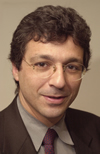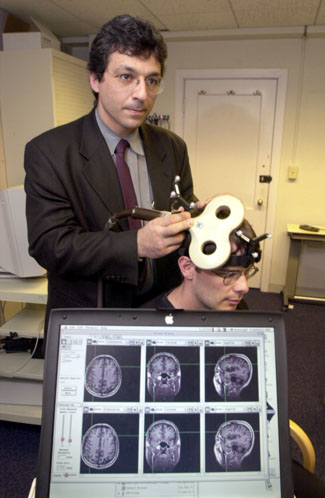Alvaro Pascual-Leone
From Psy3242
Bchristian (Talk | contribs) (→Overview) |
Bchristian (Talk | contribs) (→Publications and Awards) |
||
| Line 16: | Line 16: | ||
== Publications and Awards == | == Publications and Awards == | ||
| - | He has received numerous prestigious honors and awards in his field, including the Daniel D. Federman Outstanding Clinical Educator Award from Harvard Medical School, the Normand Geschwind Prize in Behavioral Neurology from the American Academy of Neurology, and the Ramon y Cajal Award in Neuroscience in his homeland of Spain. Pascual-Leone has been credited for over 200 articles in peer-reviewed journals, two books, and over 100 review articles and chapters. Some of his recently published articles include "The Brain the Plays Music and is Changed by It" (2001), "The Plastic Human Brain Cortex" (2005), and "The Role of Reading Activity on the Modulation of Motor Cortical Outputs to the Reading Hand in Braille Readers" (1995). | + | He has received numerous prestigious honors and awards in his field, including the Daniel D. Federman Outstanding Clinical Educator Award from Harvard Medical School, the Normand Geschwind Prize in Behavioral Neurology from the American Academy of Neurology, and the Ramon y Cajal Award in Neuroscience in his homeland of Spain. Pascual-Leone has been credited for over 200 articles in peer-reviewed journals, two books, and over 100 review articles and chapters. Some of his recently published articles include "The Brain the Plays Music and is Changed by It" (2001), "The Plastic Human Brain Cortex" (2005), and "The Role of Reading Activity on the Modulation of Motor Cortical Outputs to the Reading Hand in Braille Readers" [[Pascual-Leone et al. (1995)]]. |
| - | + | ||
== Research and Views == | == Research and Views == | ||
Revision as of 18:17, 27 April 2008
Contents |
Overview
Alvaro Pascual-Leone, M.D., Ph.D., is the Director of the Center for Non-Invasive Brain Stimulation and a professor of neurology at Harvard Medical School and the Beth Israel Deaconess Medical Center in Boston, Massachusetts. He also holds numerous other positions including the status of Adjunct Professor both in Psychiatry and Neurobiology at Boston University and in Cognitive Neuroscience at the Faculty of Arts and Science at Harvard University, as well as the Associate Director of the Harvard-Thorndike General Clinical Research Center. He is Board-Certified in Neurology and Neurophysiology by the American Board of Psychiatry and Neurology. One of Pascual-Leone's greatest areas of accomplishment and self-proclaimed interest is in the psychological phenomenon of plasticity (involved in the Cohen et al. (1997) study), or the constant changing of the brain and nervous system.
Personal History
A native of Spain, Pascual-Leone was born and raised in Valencia, where he later studied at the University of Valencia and completed a Ph.D. in Neurophysiology. He also studied in Germany, at the Albert-Ludwigs University and then came to the United States where he completed a fellowship in Clinical Neurophysiology at the University of Minnesota. After going back to Spain and working for four years as the Associate Professor of Physiology at the University of Valencia, Pascual-Leone finally joined the team at Harvard Medical School and the Beth Israel Deaconess Medical Center (BIDMC).
Today, Pascual-Leone remains clinically active at Harvard and BIDMC, with an outpatient clinic at the Behavioral Neurology Unit and an inpatient clinic at the Department of Neurology. He mentors young investigators in the field and is on the boards of the Organization for Human Brain Mapping, Northstar Neuroscience, Novavision, and the Institut Guttmann in Barcelona, Spain.
Publications and Awards
He has received numerous prestigious honors and awards in his field, including the Daniel D. Federman Outstanding Clinical Educator Award from Harvard Medical School, the Normand Geschwind Prize in Behavioral Neurology from the American Academy of Neurology, and the Ramon y Cajal Award in Neuroscience in his homeland of Spain. Pascual-Leone has been credited for over 200 articles in peer-reviewed journals, two books, and over 100 review articles and chapters. Some of his recently published articles include "The Brain the Plays Music and is Changed by It" (2001), "The Plastic Human Brain Cortex" (2005), and "The Role of Reading Activity on the Modulation of Motor Cortical Outputs to the Reading Hand in Braille Readers" Pascual-Leone et al. (1995).
Research and Views
Alvaro Pascual-Leone has himself stated that his main goal is to "understand neural plasticity at system's level". He believes that plasticity is an integral part or the nervous system and an "obligatory consequence" of awareness, sensory input, motor activity, association, and action plan, and that it constitutes the normal state of the nervous system. Through this, plasticity becomes the mechanism for development and learning, functional recovery, and the cause of disease. One of Pascual-Leone's ambitions is to learn enough about plasticity in order to be able to manipulate its mechanisms - suppressing some changes and promoting others - to create new benefits for the field of research and the individual.
Pascual-Leone's research mainly uses a combination of numerous brain imaging and neurophysiologic methodologies to establish relationships between brain activation of particular areas and resulting behavior. PET and fMRI are a couple of these brain imaging techniques, as well as TMS, which can temporarily "deactivate" a specified area of the brain and effectively verify causal relationships. EEG's, MEG's, and ERP's also aid Pascual-Leone in his research on chronometry. Repeated applications of TMS along with one of the other non-invasive methods in his lab allow for the modulation of brain activity in a specified cortical target area and its functionally connected cortico-subcortical neural networks. Such non-invasive procedures in Pascual-Leone's research may lead to more intrusive modulations in brain activity, as well as future clinical advantages in neuropsychiatry and neurorehabilitation.


